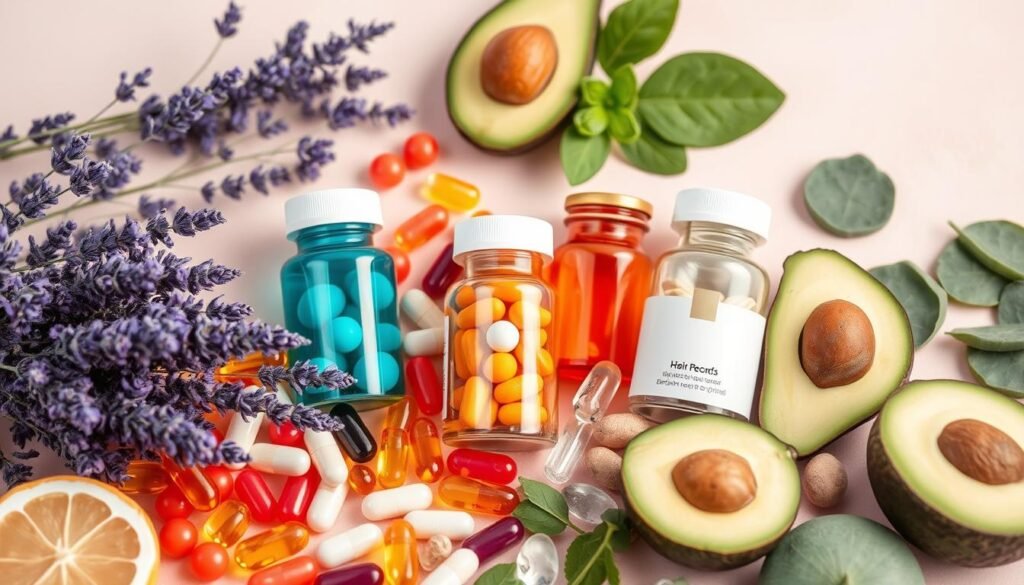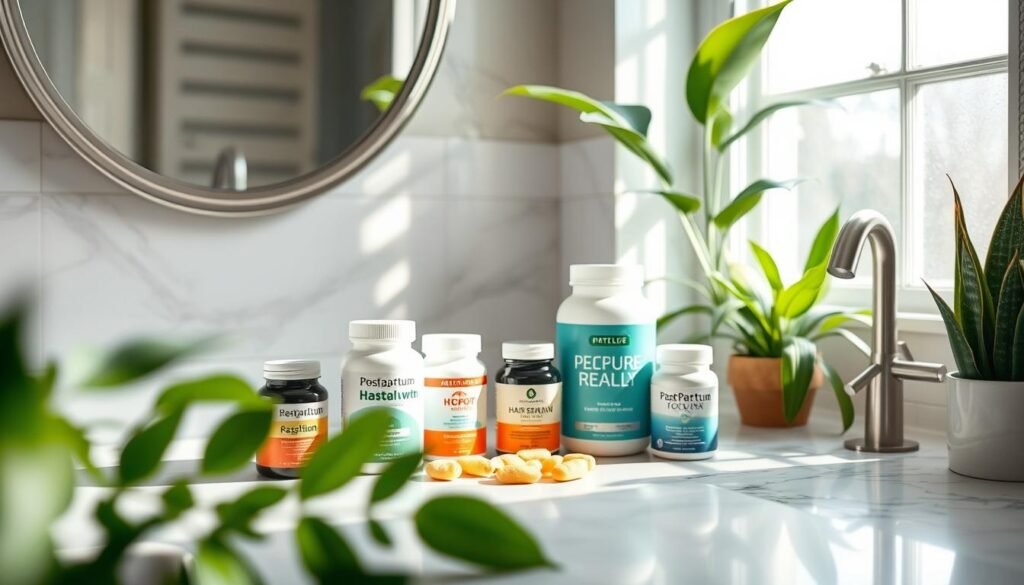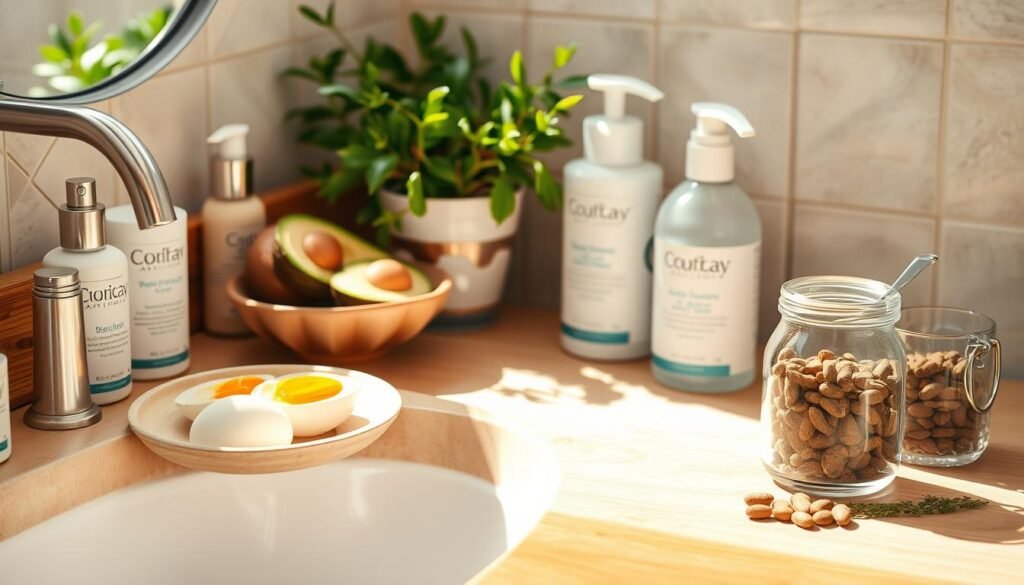Did you know postpartum hair loss can result in losing 50 to 100 hairs each day? The American Academy of Dermatology shares this surprising fact. Many new moms face hair loss as their hormones change after having a baby. This hair loss usually peaks four months after birth and might last a year. Knowing about postpartum vitamins for hair loss is key for those who want to fight this condition and help their hair grow back healthy.
This article looks at the best postpartum vitamins and supplements for hair health. It’s for moms who want to feel beautiful during this big change. We’ll talk about important nutrients that are good for hair, but also for skin and nails. For example, Pink Stork Postpartum Hair Loss Gummies are an easy way for nursing moms to get these nutrients every day.
Let’s dive into these essential nutrients. We’ll see how they help with recovery and overall health after having a baby.
Key Takeaways
- Postpartum hair loss is normal, with affected individuals shedding between 50 to 100 hairs daily.
- Hormonal fluctuations are a primary cause of hair loss following childbirth.
- Incorporating postpartum hair growth supplements can promote stronger hair and healthier skin.
- Products like Pink Stork Total Glow provide essential nutrients like biotin to support recovery.
- The best postpartum vitamins include biotin, vitamin E, and others that support hair health.
Understanding Postpartum Hair Loss
Many new moms face postpartum hair loss. About 40-50% of women go through this. It’s known as telogen effluvium. Hair usually starts to fall out three months after giving birth. This is due to big changes in hormones.
During pregnancy, higher estrogen levels make hair thicker by keeping it from falling out. But after birth, these hormone levels drop quickly. This leads to a lot of hair loss.
Postpartum hair loss often lasts from six to twelve months. At this point, most women’s hair gets back to its usual thickness. But, moms who breastfeed might lose hair for a longer time because of hormone changes.
Not getting enough nutrients can make hair loss worse, especially in breastfeeding moms. The body uses these nutrients for milk first, not hair health.
Some things can make treating postpartum hair loss harder. Not taking care of thyroid issues can increase hair loss. Genetics can also play a role in how much hair thins.
Both emotional and physical stress from having a baby can lead to more hair loss. When hormone levels get back to normal after birth, it can cause a lot of hair to fall out. This is something many new moms notice.
| Factor | Impact on Hair Loss |
|---|---|
| Hormonal Changes | Decline in estrogen leads to increased shedding. |
| Breastfeeding | Prolonged duration of hair loss due to hormonal fluctuations. |
| Nutritional Deficiencies | Decreased availability of essential nutrients for hair health. |
| Thyroid Conditions | Can worsen hair loss if untreated. |
| Genetic Factors | May influence the extent of hair thinning. |
| Emotional Stress | Can exacerbate hair shedding in new mothers. |
Understanding and managing hair loss after pregnancy is important. If the shedding is a lot, finding the right treatment is key. It helps with recovery and brings back confidence in your hair’s health.
Why Do Women Experience Hair Loss After Pregnancy?
About 40-50% of women face hair loss after pregnancy. This happens due to hormonal changes, mainly a sharp drop in estrogen levels after giving birth. High estrogen during pregnancy stops hair from falling out. Yet, after the baby is born, this changes.
Women might see more hair fall out around three months after having a baby. This loss can reach its peak four months after birth and last up to a year. For those who already had thin hair, postpartum hair loss is even more evident. Hence, finding effective postpartum hair loss remedies is crucial.
New mothers face hair loss not just because of hormone changes. Stress, poor nutrition, and lack of sleep also play big roles. Not getting enough iron and vitamin D hurts hair growth too. It’s important for new moms to eat well, focusing on protein, iron, fatty acids, and vitamin D.
Changes in hair texture and volume mean moms might need to update their hair care routines. This helps handle the thinner hair better during the postpartum period.
Learning about postpartum hair loss is good. But, talking to a doctor is key for personal guidance, especially if the hair loss lasts long or seems too much.
Postpartum Vitamins for Hair Loss
Many women want to fix their hair loss after having a baby. Vitamins play a big part in getting hair healthy again. Adding the right vitamins to your daily life can battle the bad effects of hormone changes and not having enough nutrients after the baby comes.
Key Nutrients to Consider
Some nutrients are key in fighting postpartum hair loss. These include:
- Vitamin D: It’s important for hair growth.
- Biotin: It helps make keratin, which is vital for hair.
- Vitamin E: Works as an antioxidant, helping hair roots stay healthy.
- B Vitamins: Boosts blood flow to the scalp, which brings nutrients.
These are among the best vitamins to stop hair loss after having a baby. They help women feel better about their looks while recovering.
How These Vitamins Help
Postpartum vitamins are great for getting your hair back to good. Vitamin D is key for new hair growth. It fights the usual hair loss seen about six to twelve weeks after the baby is born. Biotin makes hair strong and healthy. This is especially true if you’re not getting enough usually.
Vitamin E fights the things that can hurt hair roots. This leads to stronger hair. B vitamins, like B12 and niacin, make more blood flow to your scalp. This feeds your hair roots and makes them strong. Adding these vitamins to your day can help with the sad feelings of losing hair after pregnancy.
Essential Vitamins for Postpartum Hair Growth
After giving birth, many women experience hair loss. This is due to hormonal changes. Adding specific vitamins to their diet can help bring back hair growth. Targeting vitamins for postpartum hair regrowth is key during this period of change. Here are three important vitamins that can improve hair health after childbirth.
Vitamin D: The Sunshine Vitamin
Vitamin D is vital for hair growth. Not having enough can cause hair loss. It’s important for new moms to keep their vitamin D at healthy levels. Getting vitamin D can come from the sun or foods rich in this nutrient. This helps not just with hair, but overall health too.
Biotin: The Hair Growth Hero
For hair health, biotin is a must for women after childbirth. It boosts keratin production which strengthens hair and reduces breakage. If you don’t get enough biotin, hair may thin out. Taking at least 1000 micrograms of biotin daily can support hair regrowth.
Vitamin E: The Antioxidant Protector
Vitamin E is a strong antioxidant. It protects hair from oxidative stress damage. Research shows it can help hair grow and keep follicles healthy. Plus, vitamin E improves blood flow in the scalp. This is crucial for growing new hair.

| Vitamin | Benefits | Sources |
|---|---|---|
| Vitamin D | Supports hair follicle health | Sunlight, fatty fish, fortified dairy |
| Biotin | Promotes keratin production for strong hair | Eggs, almonds, avocados |
| Vitamin E | Protects hair follicles from oxidative stress | Nuts, seeds, spinach |
Important Minerals for Supporting Hair Health
The path of motherhood includes the challenge of postpartum hair loss. Keeping up with essential minerals is key for moms wanting to keep their hair healthy. By focusing on the right vitamins, mothers can boost their hair’s health. This allows them to feel more confident and full of life.
Iron: Fueling Hair Follicle Health
Iron is crucial for getting oxygen to hair follicles, helping them thrive. Many new moms may not have enough iron, which can cause more hair to fall out. Adding foods rich in iron or supplements aimed at hair growth postpartum can support healthier hair growth.
Zinc: Enhancing Hair Growth
Zinc plays a key role in growing and repairing hair tissue. It keeps the oil glands around hair follicles working well. Not having enough zinc can cause hair loss. Moms should make sure they get enough zinc from food or supplements. This supports hair health as they adjust to new motherhood.
Magnesium: A Scalp Superhero
Magnesium is essential for many body functions, including hair health. It stops calcium from building up in hair follicles, so they function well. This mineral also helps make proteins needed for hair’s structure and boosts scalp health. It enhances the benefits of vitamins taken for postpartum hair loss.
| Mineral | Role in Hair Health | Sources |
|---|---|---|
| Iron | Supports oxygen transport to hair follicles | Red meat, beans, lentils, spinach |
| Zinc | Aids in hair tissue growth and repair | Shellfish, nuts, seeds, whole grains |
| Magnesium | Prevents calcium buildup, supporting hair function | Dark leafy greens, nuts, seeds, whole grains |
The Role of Dietary Supplements
Finding the right dietary supplements is essential for women wanting to improve their hair health after having a baby. Good quality supplements can make a big difference, providing vital nutrients often missing from everyday meals. It’s crucial to pick supplements rich in top postpartum vitamins, aimed at aiding hair recovery with a mix of vitamins and minerals.
Choosing the Right Formulations
Look for postpartum hair growth supplements containing:
- Biotin and Vitamin E for stronger hair.
- Iron to help prevent hair loss.
- Zinc for better hair health and growth.
Research the brands and their ingredients to ensure safety and effectiveness, especially for breastfeeding moms. Choose reliable brands that support their products with scientific evidence.
Benefits of Comprehensive Supplements
Comprehensive hair growth supplements provide several advantages:
- They tackle different nutrient shortages, promoting general health.
- These supplements increase hair thickness and volume.
- They also help in balancing hormones essential for hair regrowth.
Talking to a healthcare provider before using supplements is wise for new mothers. This step is crucial in safely enjoying the benefits of the best postpartum vitamins without side effects.

| Supplement | Key Ingredient | Benefit |
|---|---|---|
| Nutrafol | Biotin | Supports hair growth and thickness |
| VitaFusion | Vitamin E | Acts as an antioxidant for scalp health |
| Hairfinity | Zinc | Promotes healthy hair follicles |
| Garden of Life | Iron | Fights iron deficiency related hair loss |
Popular Postpartum Hair Growth Supplements
After having a baby, many women struggle with hair loss. Finding the right supplements is key to getting healthy hair back. Here are some top picks that have worked well for others.
Product Recommendations
- Pink Stork Total Glow: Hair, Skin, and Nails Gummies – Inside each bottle, you’ll find 60 gummies. You should take 2 gummies each day. They taste like strawberries and help your scalp and hair get strong during the time after childbirth. These are cruelty-free, without any animal products.
- Nutrafol Postpartum Capsules – With 21 ingredients that work, over 1,100 doctors suggest trying Nutrafol. This supplement helps make hair thicker and stronger. Many see results in just a few months. It has hydrolyzed marine collagen and comes with enough capsules for 30 days.
- Eu Natural Vibrance Hair Growth Vitamins – Eu Natural focuses on giving you the nutrients you need for strong hair. They are known for their high-quality ingredients, specifically chosen to help after having a baby.
Consumer Experiences and Reviews
Women have shared how these supplements have helped their hair become thicker and healthier. Their stories underline how vital a customized approach is. Many noticed their hair was thicker and they were losing less of it.
| Product | Key Features | User Feedback |
|---|---|---|
| Pink Stork Gummies | 60 gummies, strawberry flavor, supports hair health | Positive feedback on taste and effectiveness |
| Nutrafol Capsules | 120 capsules, clinically effective ingredients | Reported improvements in hair thickness and strength |
| Eu Natural Vibrance | Focus on essential nutrients for hair | Recognized for quality and effectiveness |
Postpartum Hair Loss Remedies
Postpartum hair loss remedies aid women facing hair changes after childbirth. They can help in regaining hair strength and encouraging growth. This includes using topical treatments and doing scalp massages for self-care.
Topical Treatments
Topical treatments like serums support tackling postpartum hair loss. One good product is Women’s Rogaine Unscented 5% Minoxidil Foam. It may boost hair growth by enhancing scalp blood flow and rejuvenating hair roots. Combining it with hair regrowth vitamins can improve outcomes, offering a comprehensive hair recovery plan.
Scalp Massage Techniques
Scalp massage techniques are beneficial for postpartum hair loss. Massaging the scalp softly boosts blood circulation, bringing essential nutrients to hair roots. This action can increase hair growth and improve hair health. Moreover, regular scalp massages can be a calming routine for new moms. It reduces stress that affects hair health. Using these massages with other remedies offers a full recovery strategy.

When to Seek Professional Help
Postpartum hair loss is common, usually starting three to six months after giving birth. This happens because estrogen levels drop after delivery. For most, hair gets thicker again within six months to a year. If your hair keeps thinning after one year or if you see other worrying signs, it’s time to see a doctor.
Loss of hair after pregnancy can be stressful, both emotionally and physically. Getting help early can make a big difference. Dermatologists can find out if another health issue is causing your hair loss. They might suggest postpartum hair loss treatments that are safe. Options include at-home low-level laser therapy (LLLT) with devices like Theradome™. Other treatments, like PRP (Platelet-Rich Plasma) therapy, involve scalp injections to help hair grow.
Specific supplements, like Nutrafol, target hormonal and stress-related hair loss after childbirth. They offer a month’s supply of pills for new moms. Also, some hair care products are made for sensitive scalps. These can help your hair become healthier.
Dermatologists might also recommend treatments like minoxidil for severe hair loss. If hair loss lasts more than the typical six months to a year, seeing a professional is crucial. They can find the right treatment for you.
Knowing when to get help is key to managing hair loss after pregnancy. Taking steps early helps with quicker and better hair recovery. This improves your hair’s thickness and scalp health.
Conclusion
It’s important for new moms to understand why they lose hair after having a baby. This condition, called telogen effluvium, usually starts 3 to 6 months postpartum. Thankfully, most women see their hair start to improve within 6 to 12 months.
Helping hair regain its health can be quicker with certain steps. Taking top postpartum vitamins like biotin, iron, and vitamins C and D is key. Eating well helps too.
Scalp massages are another natural way to boost hair growth. They work by improving blood flow to your hair roots. Also, top-notch supplements geared towards postpartum women can help fill in any nutritional gaps, aiding in hair regrowth.
It’s smart to talk to a healthcare expert if you’re worried about your hair loss. This is especially true if your hair loss lasts more than a year or if your hair is getting much thinner.
By combining the right nutrients, changes to your lifestyle, and advice from professionals, you can fight postpartum hair loss. This allows you to focus on the joy of being a new mom with healthy, full hair. For extra tips and advice from experts, visit this link.